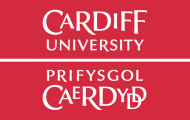Researchers from Cardiff University are working on a £6.1m UKRI-EPSRC programme to transform the way data is sensed, transferred between and processed on silicon chips.
Working with colleagues from UCL, Cambridge and Southampton Universities, the scientists are aiming to create circuits where quantum dot laser sources are integrated on a single piece of silicon.
The Quantum Dots on Silicon (QUDOS) programme is investigating new ways of integrating all the parts that are needed for high capacity optical communications and signal processing on a microchip.
The sensing, processing and transport of information is at the heart of modern life – from smart phones to satellite navigation systems. The internet depends on optical systems from fibre to the home, through data centres to trans-oceanic optical cables that link up the world.
Creating these systems requires the mechanical alignment of components to accuracies of less than a micron – about one hundredth of the diameter of a human hair – a costly and labour-intensive process.
The team have invented technologies to integrate the required components on silicon chips, making possible the first data interconnects, switches and sensors.
Professor Peter Smowton, Managing Director of Cardiff University’s ERDF-funded Institute for Compound Semiconductors said:
We are proud to be a partner in the QUDOS project – another critical step in the evolution of Compound Semiconductor science, developing the next generation of key enabling technology and building a UK manufacturing strength.
QUDOS has evolved from our work on the EPSRC Compound Semiconductor Manufacturing Hub and will align our activities across CSConnected – a £43.7m flagship project to develop the world’s first Compound Semiconductor cluster, which recently received from UKRI’s Strength In Places Fund.
I look forward to working with outstanding academic colleagues from UCL, Cambridge, Cardiff and Southampton with further scientific breakthroughs and their translation to our industrial partners including the South Wales centred CSConnected.
QUDOS builds on previous work by team members which demonstrated the world's first successful telecommunications wavelength lasers directly integrated on silicon substrates.
Removing the need to assemble individual components will enable vastly increased scale and functionality for information systems at greatly reduced cost.
Professor Alwyn Seeds, Principal Investigator for QUDOS said:
The QUDOS Programme, through the monolithic integration of all required optical ICT functions on silicon, will have a similar transformative effect on ICT to that which the creation of the first silicon integrated electronic circuits had on electronics.
I look forward to working with distinguished colleagues from Cambridge, Cardiff and Southampton Universities, together with outstanding industrial partners spanning the supply chain from materials to systems, to make this vision a reality.




